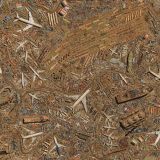Cassio Vasconcellos
Collective: Beyond Reality
General Guisan Quai
Through this series, Cássio Vasconcellos aims to address forcefully – from small to large scale – the theme of globalization and the explosion of consumer goods. Through his peculiar point of view, he raises important issues, such as the demands on the planet, the existing macro industrial scheme to supply the needs of society or the occupation of land.
“Collective” is the result of a need to share a critical view of the world. Composed of over a thousand photographs, the work presents itself as an immense communicative portal of the relationship between humanity and its new way to interact with time and space. In a playful way, Cássio creates landscapes that oscillate between the real and the imaginary.
It is through this spirit and ambivalent language, that Cássio opens a dialogue about the planet and humanity, the physical space and time, creating an important consideration for our future.
Vasconcellos has had his images exhibited over 200 times in 20 countries. Some of his recent exhibitions: Fondation Cartier pour l’art contemporain, Paris, France; National Gallery of Victoria, Melbourne, Australia; UCCA Center for Contemporary Art, Beijing, China; Museum of Modern Art, São Paulo, Brazil; Phoenix Art Museum, Phoenix, Arizona, USA; Princeton University Art Museum, Princeton, New Jersey, USA.
The Brazilian photographer has 14 books published. In addition, he has received numerous awards. The artist’s photographs are held in Brazil’s main private collections as well in museums such as the Bibliothèque Nationale, Paris, France and the Museum of Fine Arts, Houston, USA.
Curated by Lois Lammerhuber / Printed by ![]()
Discover here contributions of ETH Zurich to the Sustainable Development Goal (SDG) 8:
Fighting for better farm labour
Eva-Marie Meemken
Professor Eva-Marie Meemken’s academic work in agricultural sciences and economics has taken her to Germany, Mexico, the United States and Denmark. Through time spent on Canadian, Spanish and German farms, and in development collaboration projects in Bangladesh and Peru, she gained valuable practical experience.
Eva-Marie has always been interested in the origins of the food we consume, and the social conditions under which it is produced. In search of ways to promote more decent work in the agricultural sector, she launched a project with a focus on Fairtrade certification. This research took her to Uganda, where she conducted focus group discussions and a large survey with smallholder coffee farmers. In East Africa, it is not unusual for farmers to use prisoners as free labour on their farms. Fairtrade rules prohibit that practice, but Eva-Marie couldn’t help but wonder: if I were a convict, would I prefer spending my days in a prison cell or working hard on a farm?
She also understood that, beyond this specific practice, the challenge of decent farm labour is a crucial but overlooked topic. Hired farm workers often face precarious working conditions, in both higher- and lower-income countries, and have the least power of any participant in global food supply chains.
Collecting data on wage labour in the agricultural sector is far from straight-forward. It involves finding and interviewing workers, who are often seasonal migrants. The work is often difficult, and it can be risky. But Eva-Marie and her group took on the challenge.
Research for better working conditions
Her research group focuses on two main questions related to farm labour. One question asks how policy and technology can help to improve working conditions in agriculture, food processing, and food services. How labour shortages can be addressed is the second question.
Labour shortages are common in many countries all over the world. But the reasons, impacts, and measures that can be taken to address them remain poorly understood. Today, Eva-Marie’s research group focuses on case-studies from Nigeria, Myanmar, Ghana, and Switzerland, using large surveys to collect data from both workers and their employers such as farms or agrifood companies.
Progress through policy and technology
Although much still needs to be done to improve precarious working conditions in the agrifood sector, the fact remains that this is a sector which employs many low-skilled workers from lower-income nations, either at home or abroad. These employment opportunities are crucial, especially in countries with high rates of unemployment and underemployment.
“We need to develop and identify policies and technologies that promote well-being among both the people who produce food, as well as the people who consume it. Decent work is just one aspect, but one that deserves more attention and funding.”
Prof. Dr. Eva-Marie Meemken, Head of Food Systems Economics and Policy Group at ETH Zurich
The future of better work
Gudela Grote
Professor Gudela Grote’s fascination with work and organisational psychology stems from a simple but powerful observation: that work is crucial to well-being. It follows that designing better work is necessary to help people lead a better life. Gudela is also intrigued by how work connects to people’s identity and skills development. Her research dives deep into individuals’ work practices, probing how and why people succeed beyond simply completing tasks.
How can working conditions be improved?
The overall goal of Gudela’s research group is to improve working conditions in ways that allow people to do their work well, to learn, and to develop their personal capacities in the process. At its most basic, the aim is to earn a living in working environments that promote well-being, and at the very least cause no harm.
The group pursues three main research strands. One is a biennial survey on working conditions in Switzerland, which serves as a basis for company and policy decisions to improve conditions. The second strand is made up of several projects on how AI-based technology, and new technology more generally, is changing the nature of work. This includes analysis of how to foster effective integration of technology into work early on in the adoption process. The group puts a special emphasis on aligning accountability for work outcomes with control over how these work outcomes are produced using the technologies. In the third strand, the team investigates how individuals and organisations manage uncertainty in work-related processes, whether through designing new rules, encouraging employees to speak up, or advocating organisational change.
At the centre of what they do is the drive to create decent work for all, and to link good working conditions with economic effectiveness. Gudela and her team are convinced that people will be more motivated and productive if they are respected at work, have opportunities to learn and develop, or have a degree of autonomy.
Are you happy with your working conditions?
Gudela advocates for decision makers in organisations or government to reflect on working conditions and how they might be improved. This requires them to better understand the link between working conditions and economic effectiveness.
In her vision of the future, technology will be used in ways that make work better, rather than boosting productivity. This could mean reducing work hours for all, enhancing well-being and personal development through decent working conditions, or providing access to formal and informal learning as a basis for sustainable employment.
“If things do not go well at work, fix the situation rather than the people.”
Prof. Dr. Gudela Grote, Chair of Work and Organizational Psychology at ETH Zurich
Greening international trade
Thomas Bernauer
In his research and teaching, Professor Thomas Bernauer focuses on how global environmental problems emerge, and how they could be solved. He is particularly interested in how to design policies that are effective in terms of solving environmental problems, but also politically feasible in light of the specific interests of citizens, consumers, businesses and political groups.
Thomas received his education in political science in Zurich, Geneva, and in Boston, USA. He worked for the United Nations for several years and has been a professor at ETH Zurich since 1995.
International trade and environmental protection: a contradiction in terms?
One key area of his research is the relationship between international trade and environmental protection. Economic globalisation, and international trade in particular, is both a blessing and a curse. Most people are deeply conflicted about it: we love its benefits as consumers and travellers, and it has helped countries like Switzerland to prosper– but we also worry about how globalization is changing our societies, including shifts in cultural identity or economic and environmental risks.
People in rich countries like Switzerland consume a huge amount of imported goods whose production causes environmental damage abroad, and this is the most important environmental challenge associated with international trade. Those goods might include minerals extracted with mining operations that harm the surrounding environment, or foods like palm oil that may be produced unsustainably. In fact, as much as 80% of the total environmental impact of consumption by Swiss citizens takes place outside the country’s borders. This means that, in ecological terms, we live at the expense of other countries.
Thomas’ research examines this phenomenon, probing how international trade contributes to the shift in environmental impacts through global supply chains. It also looks more specifically at who offloads those impacts onto whom, investigating how countries impose environmental damage on each other through their consumption and trade patterns, and what could be done about it. For example, his group has studied how to design international trade agreements, and sustainability rules for global supply chains, so they are both environmentally effective and acceptable to consumers.
How to reduce our consumption footprint on a large scale
The global environmental footprint of local consumption shows that it is not enough to meet environmental quality goals only within rich countries. If we fail to take drastic action to reduce that footprint, and if poorer countries increase their consumption as well, the world will soon cross the planetary boundaries that mark a safe operating space for humanity. This means that, while the important work of greening domestic economies continues, international trade and supply chain policies need to be redesigned too, so as to sharply reduce imports of goods whose production causes enormous environmental damage abroad.
“We appreciate the benefits of globalisation as consumers and travellers, and it has helped countries like Switzerland to prosper – but we also worry about how globalisation is changing our societies, for example through shifts in cultural identity or through economic and environmental risks”
Prof. Dr. Thomas Bernauer, Head of International Political Economy and Environmental Policy at ETH Zurich
open your eyes festival buerau
Botenaustrasse 42
9443 Widnau
Switzerland
Phone: +41 44 218 11 03




